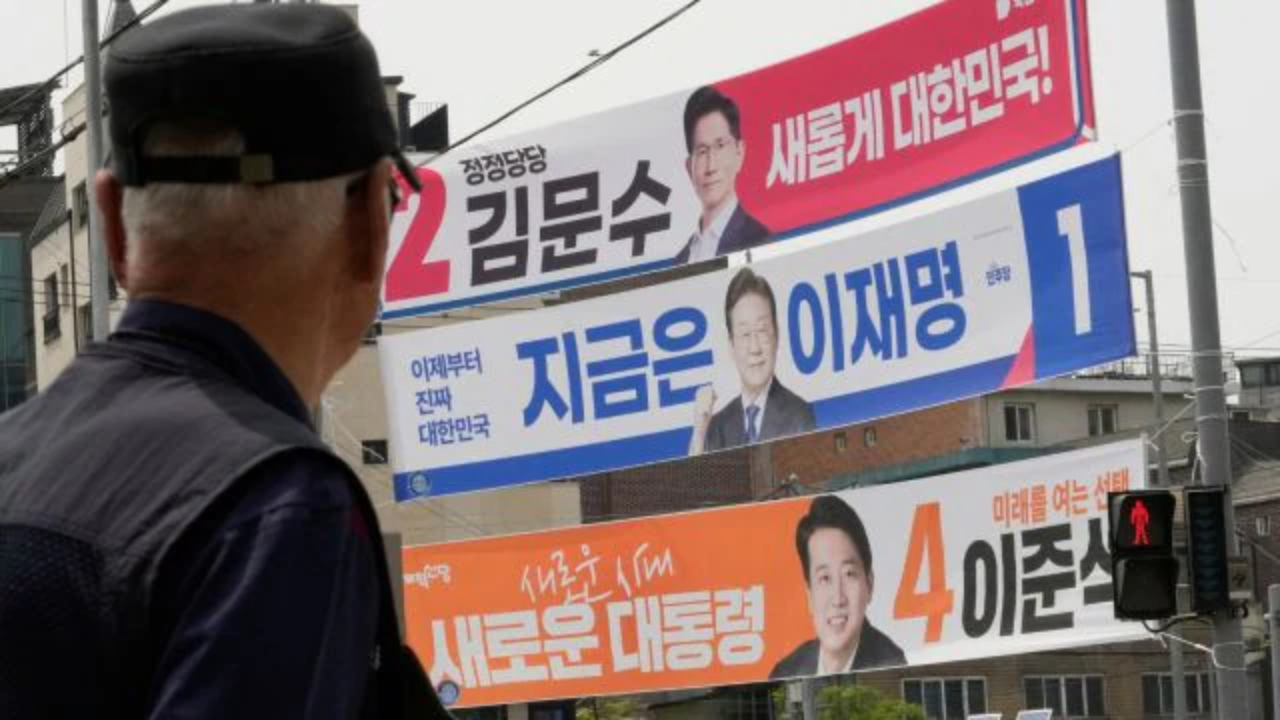
Election banners of presidential candidates in South Korea (Image: AP)
Kim Moon Soo Concedes Defeat
Kim, the candidate of the People Power Party, told a news conference early Wednesday that he “humbly accepts (the) people’s choice” and congratulates his liberal rival Lee Jae-myung for winning the election, reported AP. Kim spoke as voter turnouts and media projections showed Lee was expected to win the election.
Easy Win For Lee?
Pre-election surveys suggested Lee appeared headed for an easy win, riding on deep public frustration over the conservatives in the wake of Yoon’s martial law debacle that plunged South Korea into political turmoil. Nearly 80 per cent of the country’s 44.4 million eligible voters cast ballots, according to an interim tally. That’s one of the highest turnouts for a presidential election in South Korea, reflecting public eagerness to move past the political turmoil.
Challenges Ahead For Lee Jae-myung
As Lee looks all set to take the top office, many challenges are awaiting a new president including US President Donald Trump’s tariff policy and North Korea’s advancing nuclear programme.
1. Economy & Trump Tariff
In the run-up to the top post, Lee has promised to revitalise the economy, reduce inequality and ease national divisions.
On the economic front, Lee’s upcoming government might a bit of friction with the Trump administrations, Chung Jin-young, a former dean of the Graduate School of Pan-Pacific International Studies at South Korea’s Kyung Hee University told AP. He said that Kim’s government would likely offer more concessions to the US.
Not to mention, Lee has preached patience over Trump’s tariff policy, arguing it would be a mistake to rush negotiations in pursuit of an early agreement with Washington. Kim has said he would meet Trump as soon as possible.
Chung predicted Lee won’t be able to pursue overly drastic steps on foreign policy and security, given the country’s foreign exchange and financial markets are vulnerable to such changes.
On Monday, South Korean trade officials held an emergency meeting to discuss a response to Trump’s announcement that the US will raise tariffs on steel and aluminium products to 50% beginning Wednesday. South Korea’s central bank last week sharply lowered its 2025 growth outlook to 0.8 per cent, citing the potential impact of Trump’s tariff hikes and weak domestic demand worsened by the political turmoil of past months.
2. Relations with North Korea
Relations with North Korea remain badly strained since 2019, with the North focused on expanding its nuclear arsenal while refusing dialogues with South Korea and the US. Lee, who wants warmer ties with North Korea, recently acknowledged it would be “very difficult” to realise a summit with Kim Jong Un anytime soon, reported AP.
Lee had said he would support Trump’s push to restart talks with Kim, which he believed would eventually allow South Korea to be involved in some projects in North Korea.
3. Pragmatic Diplomacy
Lee, who served as governor of Gyeonggi province and mayor of Seongnam city, has been a highly divisive figure in politics for years. As a former child labourer known for his inspirational rags-to-riches story, Lee came to fame through biting criticism of the country’s conservative establishment and calls to build a more assertive South Korea in foreign policy.
On foreign policy, Lee has has steadfastly vowed to pursue pragmatic diplomacy. He has promised to solidify a trilateral Seoul-Washington-Tokyo partnership, a stance that is not much different than the position held by South Korea’s conservatives.
Experts say there aren’t many diplomatic options for South Korea as it tries to address Trump’s tariff hikes and calls for South Korea to pay more for the cost of the US military presence, as well as North Korea’s headlong pursuit of nuclear weapons. Experts say that has made both Lee and Kim avoid unveiling ambitious foreign policy goals.
(With inputs from AP)
